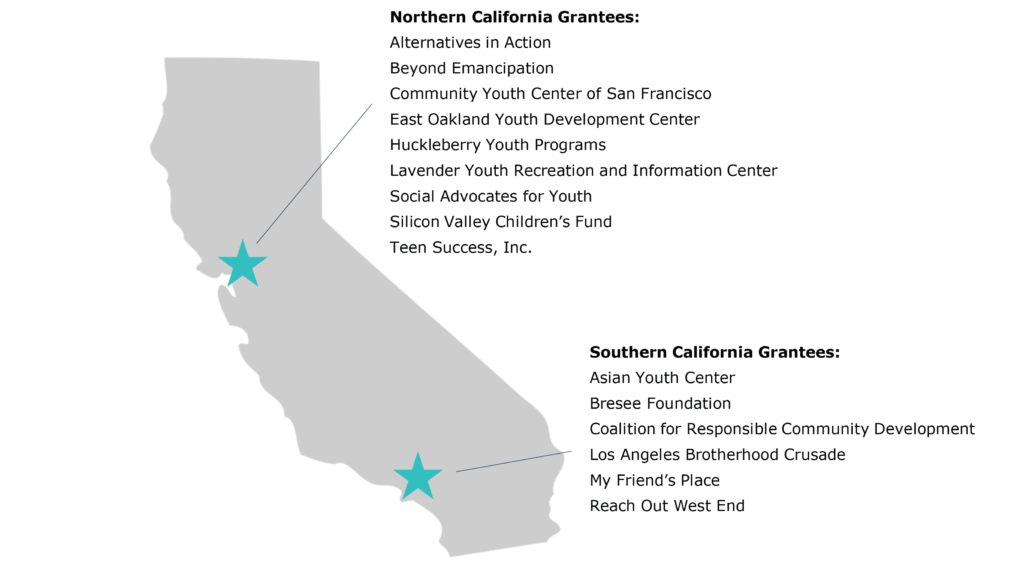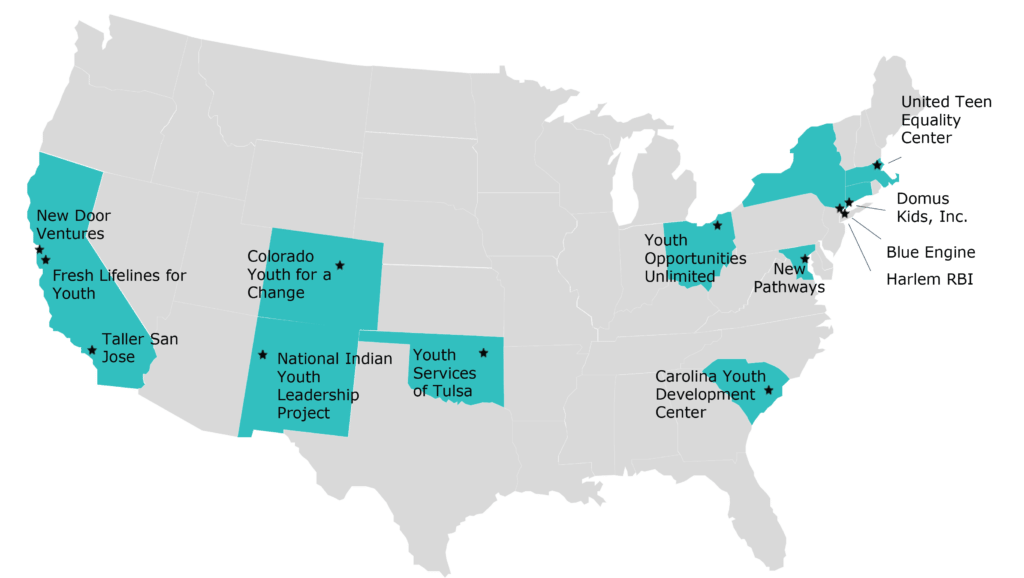

“In this era of scarcity and seismic change, high performance matters more than ever. The social and public sectors simply don’t have the resources to expend on efforts that are based primarily on good intentions and wishful thinking rather than rigor and evidence.”
– Leap of Reason Ambassadors Community
This statement rings true to many social sector leaders, yet it is challenging to find the time and resources to build performance management capacity in the social sector. In 2012, the Edna McConnell Clark Foundation launched PropelNext an integrated three-year program that provides unrestricted funding, technical assistance, and individualized coaching to help a cohort of nonprofit organizations adopt a data-driven approach to their work with at-risk youth. While many funders offer capacity-building grants, PropelNext stands apart because of its focus on improving performance management and building a results-driven culture, coupled with a substantial investment in time, support, and resources.
While simple in concept, our evaluation with the first two cohorts of PropelNext shows the effort and determination required to bring data-driven management to the social sector. The first cohort included 13 organizations from across the United States (see map below), led entirely by the Edna McConnell Clark Foundation. Based on positive feedback from organizations in the first national cohort, Edna McConnell Clark joined forces with the William and Flora Hewlett, the David and Lucile Packard, the Sobrato Family, and the Weingart Foundations in 2015 to launch a second cohort of 15 grantees based in California.
Our evaluations of PropelNext involve both cohorts:
- The first is a three-year developmental evaluation of PropelNext California currently in its second year;
- A second evaluation is a post-program study focusing on how alumni of the first national cohort are doing 1-2 years after completing PropelNext
PropelNext California

PropelNext Alumni

Both evaluations incorporate interviews, focus groups, observations of cohort convenings, and surveys with a range of participants including organization staff (Executive Directors, CEOs, senior leadership, and program staff), board members, external stakeholders, PropelNext coaches, and PropelNext investors. PropelNext recently shared reports from both evaluations on their website.
What Are We Learning From the Alumni?
Findings from the post-program study of PropelNext alumni support several truisms that we hear in the field about the hard work necessary to become a high-performing organization. More than a year after finishing the program, leaders describe their PropelNext experience as “transformational.” Specific achievements include:
- improved and expanded programming,
- increased budgets,
- expanded evaluation and learning teams, and
- new talent management systems.
Alumni also shared more ephemeral achievements like understanding “we now know what we don’t know.” All 12 CEOs that we spoke to reported that a culture of inquiry and learning is taking root at varying degrees across organizational functions including operations, finance, fund development, talent management, and communications. At the same time, PropelNext alumni recognize that they are still “on a journey of discovery” as they work to sustain, deepen, and spread the capacities they developed through the program.
Three Keys to Sustaining and Deepening
Success is not a given in this work. While all grantees in the national cohort reported that PropelNext changed the way they do business, 42% said that sustaining the momentum has been difficult. Across interviews and surveys we are learning about three keys to sustaining and deepening the learning and performance management culture:
- Disciplined use of the theory of change framework: The theories of change that grantees developed in PropelNext have continued to evolve. Leaders are using their theories of change to bring structure, focus, and intentionality to programmatic and organizational decision-making. One CEO said: “[The theory of change] is used every day…It’s used in staff meetings. It’s used to remind people how we deliver the work. It’s helped us to remember the questions that we are trying to understand and learn from our team as we look to understanding what’s working and what’s not.”
- Engaging staff and board members: Ensuring staff and board members are engaged and committed to becoming a data-driven learning organization is essential. Alumni shared several ways they are engaging these important internal stakeholders. Nearly all grantees talked about changes they’ve made to their hiring, training, and talent management processes. They also discussed bringing data reports and dashboards to board meetings to help focus board conversations on results. One alumnus explained, “We try to provide a monthly report to our board, a very top level report on what is happening with our programs, specifically by using this data…They certainly appreciate the anecdotes that we tell them, bringing some students in, or bringing some staff members in to talk about what they do and why they’re doing it, but when they can see the real numbers – because a lot of them are numbers people – they say, ‘Oh wow, this stuff really works.’”
- Promoting a learning culture: Alumni described how they are shifting mindsets, from an approach focused on data for the sole purpose of accountability to one that includes program improvement. “Data should be in service of testing assumptions” one CEO said. By changing the conversation to “what is the data telling us?” it leads to more objectivity and “thoughtful and less emotional” decision-making. Another grantee explained: “It’s just understood throughout the organization that we are looking to understand whether our program is impactful for youth. It’s not a question of ‘Do we like the program?’ It’s not ‘Do we like the people who work at it?’ It’s none of that. It’s ‘Are we having the impact that we want?’ ‘Is it pushing toward the outcomes that we know are critical for youth?’”
Key Challenges
PropelNext would not be necessary if becoming a data-driven learning organization was an easy task. A year and a half after finishing the program, alumni reflected on key challenges to sustaining change:
- Getting the right people onboard: PropelNext anticipated the importance of talent management by providing technical assistance and coaching on the topic, yet it continues to be one of the top challenges for many PropelNext grantees. Almost all organizations talked about the reality of losing staff that lacked the will or ability to shift to new data-centric ways of working. One alumnus explained how they have done “almost a complete re-tooling of what we had done before [from on-boarding to interviewing]” and there were some “long-term staff members that couldn’t adjust to those changes, so there was a lot of change for our organization that we probably did not anticipate before PropelNext.”
- Integrating and aligning efforts across the organization: The majority of alumni felt there is still considerable work to be done to more fully integrate and deepen performance management practices and strategies throughout the organization. Many grantees have made progress extending performance management capacities beyond the initial program, but half of the CEOs said it was “difficult” or “very difficult” to align and integrate across departments.
- Ensuring financial sustainability: The organizations built evaluation and learning teams and overall infrastructure as they progressed through PropelNext, and many alumni are now wrestling with how to sustain the costs of operating at this higher level. Part of the challenge is due to a perception among some local funders that alumni are now in a different league – grantees in various locations described a common challenge of “moving from one league to another league” but still not being able to access larger national funders.
Valuable Elements of PropelNext
Many of the grantees participating in PropelNext have participated in other capacity-building initiatives. We asked them what they found uniquely valuable in PropelNext to inform funders who may be interested in developing powerful capacity-building initiatives in the future – three elements stood out:
- Individualized coaching is a game changer: Grantees praised the quality and amount of dedicated coaching and technical support they received. One alumnus explained, “There’s something about having someone [a coach] who isn’t as intimately attached to your programs and your organization…having that perspective is valuable.” Another grantee said, “The technical assistance we received was world class and pushed us in a direction and advanced us in a way that we could have never done. That was really a big part of propelling us.”
- The power of the cohort model: Our evaluation confirms what others have shown – learning in a group setting and having the opportunity to make connections with other nonprofits that are facing similar issues was lauded as a valuable aspect of PropelNext. Regular in-person group learning sessions develop deep and lasting relationships with peers in their cohort, which leads to “a trust where agencies were willing to take risks in doing business differently. I think that all that was pretty critical, I don’t think this would’ve worked in email and conference calls.”
- Modeling accountability, flexibility, and humility as a funder: The Edna McConnell Clark Foundation provides more than just resources – their approach sets the stage for the work of this initiative. One alumnus described the Foundation’s “role modeling of having high standards, being demanding, hard work…being stretched beyond what we thought we were capable of in the beginning. The hard part was there, but there was also great humility.” Another grantee explained, “I felt very inspired to meet a funder that had both the sophistication and the humility that really made it safe to be vulnerable, to pull apart who we were, what we were doing, and putting it back together. I don’t think I could have done that with an arrogant foundation.” Striking the right balance between accountability and flexibility can be difficult for a funder to do, but it was important to the grantees.
For evaluators like us, data-driven management has obvious merit, but PropelNext shows that it’s not necessarily easy. Funders who want to invest in this kind of organizational development can learn from the lessons of this initiative to extend this important work into their own communities. We will continue to share key learnings as our evaluation work progresses over the next couple of years.
